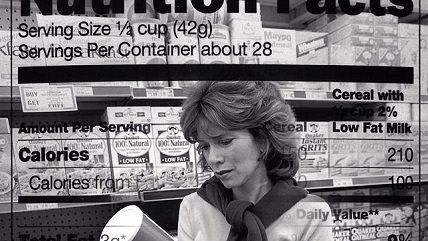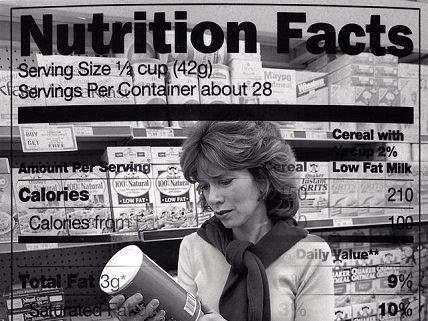The FDA's Menu-Labeling Mistake
This is a really bad idea.


Earlier this week, the FDA released rules that will force food sellers around the country to provide point-of-sale calorie information to consumers. The rules cover chain restaurants, vending machines, "movie theaters, sports stadiums, amusement parks, bowling alleys and miniature golf courses that serve prepared foods." The rules apply to foods and beverages—including beer, wine, and spirits—sold at these places.
Big deal? Not if you ask Bloomberg News reporter Anna Edney, who suggests this is just a case of the federal government "catch[ing] the rest of the country up to what cities like New York have already done."
Just what has the rest of the country been missing? Does mandatory menu labeling work? Even perhaps its most ardent supporter doesn't seem to think so.
"It won't stop the obesity epidemic, but it may make it better," said Thomas Farley, the former New York City health department head who, under then-Mayor Michael Bloomberg, implemented the nation's first mandatory menu labeling scheme in 2008.
Farley's enthusiasm might have been tempered by research showing mandatory menu-labeling doesn't work—and may even be counterproductive.
Because the new rules will cost more than a billion dollars not to stop the obesity epidemic and maybe make it better, some who have to spend that money aren't pleased.
For example, that potato salad you buy at your grocery deli counter will fall under the new rules. That doesn't sit well with grocery store owners.
"Grocery stores are not chain restaurants, which is why Congress did not initially include them in the law," said National Grocers Association president and CEO, Peter J. Larkin in a statement. "We are disappointed that the FDA's final rules will capture grocery stores, and impose such a large and costly regulatory burden on our members."
Pizza franchises like Domino's are also covered by the new rules, an issue I wrote about last year. They're fighting back, pushing legislation in Congress that would exempt them from the rules.
While some of the opponents of the new rules are obvious, one group hailing the rules this week—the support of which might surprise casual observers—was the National Restaurant Association, which supported passage of the federal law.
As I wrote last year, the NRA, which represents restaurant chains across the country, supported the national menu-labeling rule as a shield against a growing, costly, and unworkable patchwork of different state and local menu-labeling laws.
It's the same reason that food manufacturers, facing mandatory GMO-labeling pressure in dozens of states, counties, and cities around the country, are pushing for Congress to pass a uniform national GMO-labeling law.
Do I understand why the restaurant industry and food manufacturers are pushing for one bad federal law instead of hundreds or thousands of worse laws at the state and local level? Absolutely. Do I support such laws? Not at all.
When I criticized the menu-labeling rules earlier this week on Twitter—pointing out that research has shown such laws don't help people make healthier eating choices—supporters of the law jumped to its defense.
One defense of mandatory menu labeling they referenced—and which has been noted by the press—is the claim that menu labeling forces food companies to reformulate existing foods into healthier foods.
While this column isn't the place to conduct a complete analysis of reformulation claims, I can pour some cold water on the one related claim I took a few minutes to explore.
A 2012 fact sheet produced by the Center for Science in the Public Interest, which supports mandatory menu labeling, touts reformulation as a beneficial outcome of such labeling.
"Applebee's introduced its 'Unbelievably Great Tasting and Under 550 Calories' menu featuring lower calorie alternatives to their regular menu items," notes the CSPI fact sheet.
The not-terribly-subtle insinuation as to why Applebee's might have done this serves as the title of the fact sheet: Product Reformulation: A Beneficial Outcome of Menu Labeling.
But the facts don't quite mirror the fact sheet.
"Since 2004, Applebee's is the only restaurant chain to offer Weight Watchers-endorsed entrées," reads an Applebees press release from 2013. "In addition, Applebee's has offered its Unbelievably Great-Tasting and Under 550 Calories menu since 2008."
Again, New York City was the first locale in the nation, in 2008, to require menu labeling.
CSPI would have us believe that a large national restaurant chain featuring more than 2,000 locations around the country would revamp its menu nationwide because of the introduction of one law in a city that's home only to a tiny number of the chain's restaurants. We'd also have to ignore that Applebee's voluntarily offered Weight Watchers-endorsed entrées years before that. It also appears Applebee's isn't swapping out existing menu items for lower-calories options so much as its adding lower-calorie choices to sit alongside existing menu choices.
Where mandatory menu-labeling advocates see product reformulation spurred by regulations, I see a restaurant chain smartly adapting to meet changing consumer demand.
What's more, where advocates see mandatory menu labeling rules fostering new and "better" food choices, the familiar scourge of unintended consequences means the outcome of the rules may not be the one they want.
"When faced with the choice between doing calories counts for servings of romaine, iceberg, and Boston Bibb and 17 kinds of dressing, a grocery store may opt instead to shrink its offerings and move away from marketing fresh, ready-to-eat foods to customers," wrote Reason's Katherine Mangu Ward earlier this week. "On the margins, labeling may nudge some retailers to offer healthier choices, but it's also possible that grocery stores will get rid of the rabbit food altogether and just point their hungry customers to a display of Hot Pockets and a semi-sanitary microwave."
I couldn't agree more.
"I don't support coerced menu labeling generally because it limits culinary innovation and doesn't appear to achieve its stated goal of reducing calorie intake," I wrote last year. The new FDA rules only strengthen my beliefs.


Show Comments (56)